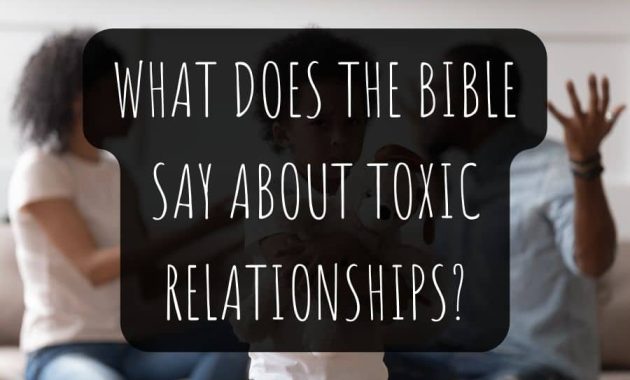What Does the Bible Say About Toxic Relationships?
Toxic relationships are unfortunately prevalent in our society today, and they can cause significant emotional, psychological, and spiritual harm to those involved.
The Bible teaches us how to navigate toxic relationships and offers wisdom on what constitutes healthy relationships.
This article will try and answer the question "what does the Bible say about toxic relationships," and how to identify and handle them biblically.
See also: What Does the Bible Say About Relationships?
Signs of toxic relationships according to the Bible

- Lack of respect: When one or both parties do not respect each other's boundaries, opinions, or feelings, it can lead to a toxic relationship. The Bible emphasizes the importance of showing honor and respect to others (Romans 12:10, 1 Peter 2:17).
- Control and manipulation: When one person tries to control or manipulate the other, it can lead to a toxic relationship. The Bible warns against such behavior and encourages individuals to avoid being influenced by others (Proverbs 25:28, Galatians 5:1).
- Constant conflict: When a relationship is characterized by continuous arguments, disagreements, and conflict, it can be toxic. The Bible encourages us to pursue peace with others and to avoid quarrels (Romans 12:18, Proverbs 17:14).
- Emotional or physical abuse: Any form of emotional or physical abuse is toxic and can cause significant harm. The Bible affirms the value and dignity of every human being and condemns abuse (Psalm 11:5, Proverbs 3:31-32).
- Enabling destructive behavior: When one person facilitates the violent behavior of the other, it can lead to a toxic relationship. The Bible encourages us to hold each other accountable and to support each other in doing what is raight (Galatians 6:1-2, James 5:16).
Examples of Toxic Relationships in the Bible
- King Saul and David: King Saul's jealousy and insecurity towards David led him to try to kill David multiple times. This toxic relationship ultimately resulted in King Saul's downfall and death (1 Samuel 18-31).
- Samson and Delilah: Samson's relationship with Delilah was characterized by manipulation and deceit, which ultimately led to his downfall and captivity (Judges 16).
- Job and his friends: Job's friends attempted to explain away his suffering and blame him for his misfortune rather than offer him comfort and support. Their toxic advice caused more harm than good (Job 2-37).
- Peter and Simon the Sorcerer: Simon, a magician, became interested in the Christian faith and was baptized by Peter. However, he later attempted to purchase the power of the Holy Spirit from Peter, revealing his selfish motives and toxic nature (Acts 8:9-24).
Biblical Approaches to Dealing with Toxic Relationships
- Set boundaries: Healthy boundaries are essential in any relationship, especially in toxic ones. The Bible encourages us to guard our hearts and to avoid being unequally yoked with unbelievers (Proverbs 4:23, 2 Corinthians 6:14).
- Speak the truth in love: When dealing with a toxic relationship, speaking the truth in love is important. The Bible encourages us to address issues directly with others and to speak the truth in love (Ephesians 4:15, Matthew 18:15).
- Seek wise counsel: Seeking wise counsel from trusted Christian friends, or a pastor can provide valuable insight and guidance in dealing with toxic relationships (Proverbs 11:14, Proverbs 15:22).
- Practice forgiveness: Forgiveness is a critical component in healing from toxic relationships. The Bible encourages us to forgive others as Christ forgave us and to let go of bitterness and resentment (Ephesians 4:32, Colossians 3:13).
- Love your enemies: Loving our enemies can be difficult, but it is a biblical approach to dealing with toxic relationships. The Bible encourages us to love our enemies, pray for those persecuting us, and overcome evil with good (Matthew 5:44, Romans 12:21).
- Seek healing and restoration: Healing and restoration are possible in toxic relationships, but it may require time, effort, and outside help. The Bible encourages us to pursue peace, to be reconciled with one another, and to seek healing and restoration in our relationships (Romans 12:18, 2 Corinthians 5:18-19).
Steps to Take After Ending a Toxic Relationship

- Take time to grieve and process: Ending a relationship, even a toxic one, can be emotionally challenging. Take time to grieve the loss and process your feelings in a healthy way by talking to a trusted friend or therapist.
- Focus on self-care: Prioritize self-care by taking care of your physical, emotional, and spiritual needs. This can include exercise, healthy eating, getting enough rest, and engaging in activities that bring you joy and fulfillment.
- Seek support: Seek support from family, friends, or a support group who can provide encouragement, accountability, and prayer during this difficult time.
- Reflect and learn: Take time to reflect on the relationship and learn from it. Identify patterns and behaviors that contributed to the toxicity and consider how to avoid them in future relationships.
- Forgive and let go: Forgiveness is essential in healing from toxic relationships. Forgive the other person and yourself, and let go of bitterness and resentment.
- Set healthy boundaries: Set healthy boundaries in future relationships to protect yourself from future toxic situations. The Bible encourages us to guard our hearts and to avoid being unequally yoked with unbelievers (Proverbs 4:23, 2 Corinthians 6:14).
- Seek spiritual guidance: Seek spiritual guidance from God through prayer, reading the Bible, and seeking counsel from a pastor or Christian mentor. Allow God to heal your heart and guide you in your future relationships.
What Does the Bible Say About Toxic Relationships - Scriptures?
- 1 Corinthians 15:33 (NIV) - "Do not be misled: 'Bad company corrupts good character.'"
- Proverbs 22:24 (NIV) - "Do not make friends with a hot-tempered person, do not associate with one easily angered."
- Proverbs 13:20 (ESV) - "Whoever walks with the wise becomes wise, but the companion of fools will suffer harm."
- Proverbs 12:26 (NIV) - "The righteous choose their friends carefully, but the way of the wicked leads them astray."
- 2 Corinthians 6:14 (NIV) - "Do not be yoked together with unbelievers. For what do righteousness and wickedness have in common? Or what fellowship can light have with darkness?"
- Proverbs 18:24 (ESV) - "A man of many companions may come to ruin, but there is a friend who sticks closer than a brother."
- Proverbs 22:24-25 (ESV) - "Make no friendship with a man given to anger, nor go with a wrathful man, lest you learn his ways and entangle yourself in a snare."
- Proverbs 18:21 (NIV) - "The tongue has the power of life and death, and those who love it will eat its fruit."
- Matthew 5:23-24 (NIV) - "Therefore, if you are offering your gift at the altar and there remember that your brother or sister has something against you, leave your gift there in front of the altar. First go and be reconciled to them; then come and offer your gift."
- Colossians 3:13 (NIV) - "Bear with each other and forgive one another if any of you has a grievance against someone. Forgive as the Lord forgave you."
FAQs About Toxic Relationships
Is it okay to end a toxic relationship?
Yes, it is okay to end a toxic relationship for the sake of your physical, emotional, and spiritual well-being. The Bible encourages us to guard our hearts and to avoid being unequally yoked with unbelievers (Proverbs 4:23, 2 Corinthians 6:14).
Can a toxic person change?
While it is possible for a toxic person to change, it requires genuine repentance and a willingness to seek help and make changes. However, it is not your responsibility to change the other person, and you should prioritize your own well-being.
How can I recognize toxic behaviors in myself?
Reflect on your actions and relationships, and consider seeking feedback from trusted friends or a therapist. Look for patterns of behavior that are manipulative, controlling, or harmful to yourself or others.
Can God heal the wounds of a toxic relationship?
Yes, God can heal the wounds of a toxic relationship. Seek God's comfort and guidance through prayer and reading the Bible, and consider seeking support from a Christian community or counselor. Remember that healing is a process, and it may take time to fully recover from the effects of a toxic relationship.

Related Posts